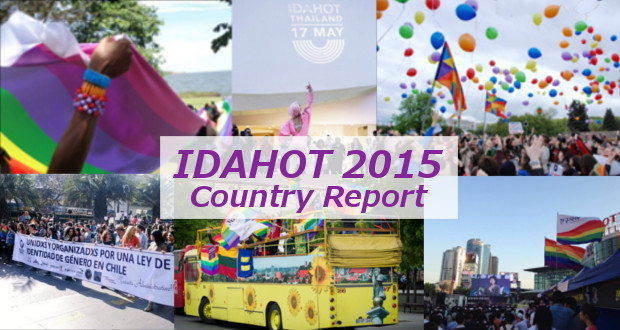Message from Ms Irina Bokova, Director-General of UNESCO
on the occasion of International Day Against Homophobia and Transphobia
17 May 2015
This year, the focus of the International Day against Homophobia and Transphobia is lesbian, gay, bisexual, transgender and intersex (LGBTI) young people. Evidence from across the world shows that these young people are overwhelmingly exposed to stigma, discrimination and violence, with tragic consequences, including lifelong trauma, self-stigma, and self-harm. LGBTI young people face also specific challenges in access to health and education. For instance, a 2014 study, conducted in Thailand with support from UNESCO, revealed that 56 percent of LGBT students had reported bullying in the last month. A significant proportion of these students reported missing classes, feeling depressed, having unprotected sex, or had attempted suicide. In a survey conducted in 28 European countries by the European Agency for Fundamental Rights, 71 percent of LGBT respondents said that it would be “measures implemented at school that would allow them to be more comfortable living as LGBT person”.
Building on its global leadership of Education for All, UNESCO launched an initiative in 2011 to prevent and combat homophobic and transphobic bullying in education. Since then, UNESCO has been mobilising partnerships and resources at global, regional and country levels. In 2013, the Government of the Netherlands decided to support the UNESCO project on Education and Respect for All: Preventing and Addressing Homophobic and Transphobic Bullying in Educational Institutions. As part of this, UNESCO has been collecting evidence on the nature, scope and consequences of homophobic bullying in educational institutions, particularly in countries where there is little or no data. UNESCO is also documenting and sharing best practices, raising awareness and building new coalitions — all of this to support country-level action to prevent and address homophobic bullying in educational institutions.
on the occasion of International Day Against Homophobia and Transphobia
17 May 2015
This year, the focus of the International Day against Homophobia and Transphobia is lesbian, gay, bisexual, transgender and intersex (LGBTI) young people. Evidence from across the world shows that these young people are overwhelmingly exposed to stigma, discrimination and violence, with tragic consequences, including lifelong trauma, self-stigma, and self-harm. LGBTI young people face also specific challenges in access to health and education. For instance, a 2014 study, conducted in Thailand with support from UNESCO, revealed that 56 percent of LGBT students had reported bullying in the last month. A significant proportion of these students reported missing classes, feeling depressed, having unprotected sex, or had attempted suicide. In a survey conducted in 28 European countries by the European Agency for Fundamental Rights, 71 percent of LGBT respondents said that it would be “measures implemented at school that would allow them to be more comfortable living as LGBT person”.
Building on its global leadership of Education for All, UNESCO launched an initiative in 2011 to prevent and combat homophobic and transphobic bullying in education. Since then, UNESCO has been mobilising partnerships and resources at global, regional and country levels. In 2013, the Government of the Netherlands decided to support the UNESCO project on Education and Respect for All: Preventing and Addressing Homophobic and Transphobic Bullying in Educational Institutions. As part of this, UNESCO has been collecting evidence on the nature, scope and consequences of homophobic bullying in educational institutions, particularly in countries where there is little or no data. UNESCO is also documenting and sharing best practices, raising awareness and building new coalitions — all of this to support country-level action to prevent and address homophobic bullying in educational institutions.
These efforts will culminate in 2016 with a meeting of Ministers of Education at UNESCO in Paris, on the occasion of the International Day against Homophobia and Transphobia. During the meeting, UNESCO will launch the first United Nations global report on the status of education sector responses to homophobic and transphobic violence, including bullying. This will provide a review of the scope and consequences of the phenomenon across regions, with examples from across the world that illustrate a holistic education sector responses, and recommendations for improvements in existing policies.
I invite Ministers of Education from all countries to join UNESCO in May 2016, so that we can reaffirm together our commitment to make schools safer for everyone, including LGBTI young people. The right to education is a basic human right, and human rights are universal – this conviction must guide all of our action.
Irina Bokova
I invite Ministers of Education from all countries to join UNESCO in May 2016, so that we can reaffirm together our commitment to make schools safer for everyone, including LGBTI young people. The right to education is a basic human right, and human rights are universal – this conviction must guide all of our action.
Irina Bokova


